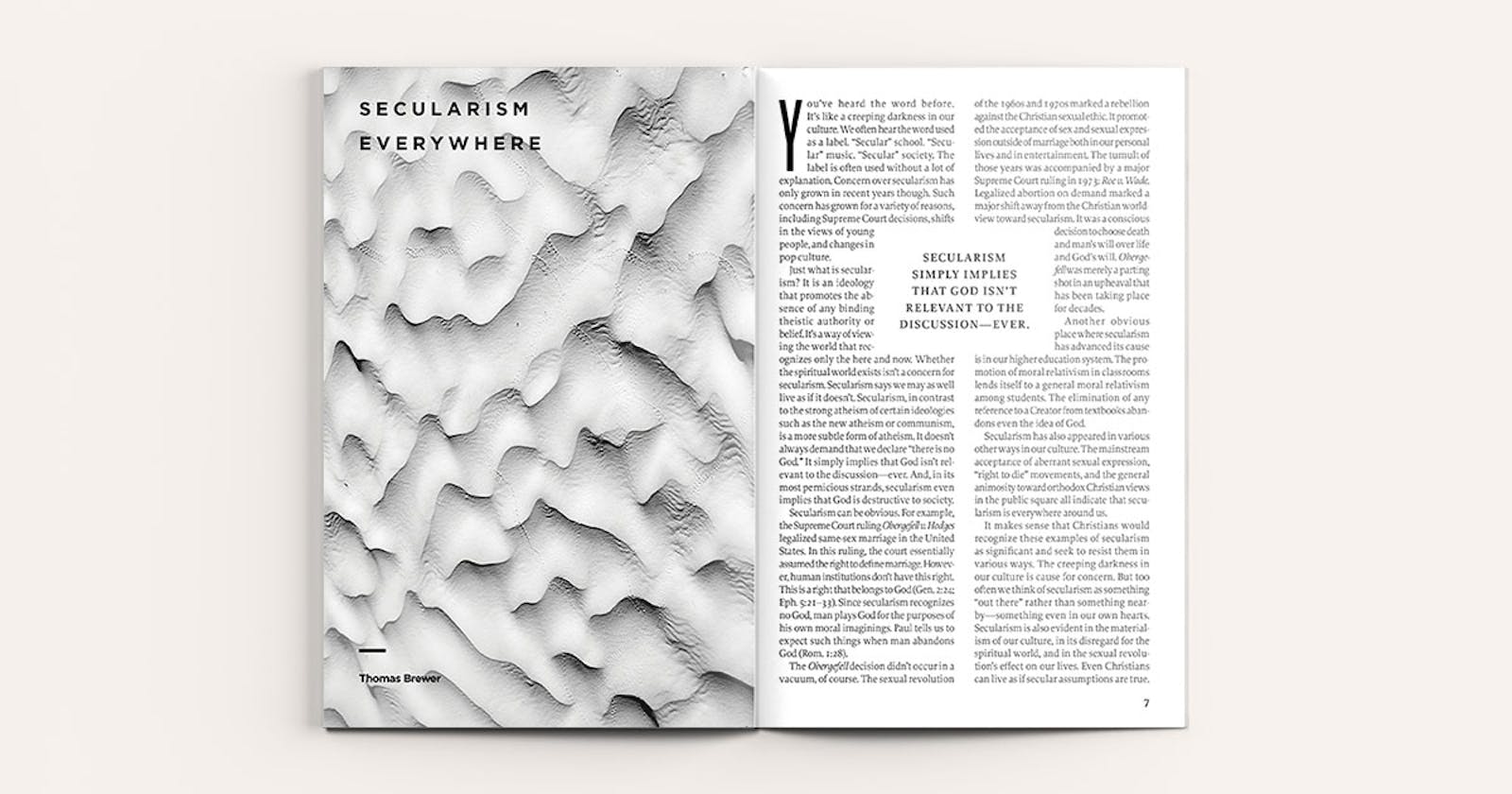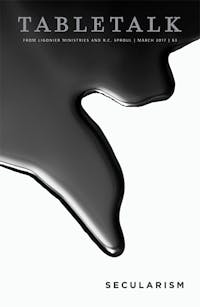
Request your free, three-month trial to Tabletalk magazine. You’ll receive the print issue monthly and gain immediate digital access to decades of archives. This trial is risk-free. No credit card required.
Try Tabletalk NowAlready receive Tabletalk magazine every month?
Verify your email address to gain unlimited access.
You’ve heard the word before. It’s like a creeping darkness in our culture. We often hear the word used as a label. “Secular” school. “Secular” music. “Secular” society. The label is often used without a lot of explanation. Concern over secularism has only grown in recent years though. Such concern has grown for a variety of reasons, including Supreme Court decisions, shifts in the views of young people, and changes in pop culture.
Just what is secularism? It is an ideology that promotes the absence of any binding theistic authority or belief. It’s a way of viewing the world that recognizes only the here and now. Whether the spiritual world exists isn’t a concern for secularism. Secularism says we may as well live as if it doesn’t. Secularism, in contrast to the strong atheism of certain ideologies such as the new atheism or communism, is a more subtle form of atheism. It doesn’t always demand that we declare “there is no God.” It simply implies that God isn’t relevant to the discussion—ever. And, in its most pernicious strands, secularism even implies that God is destructive to society.
Secularism can be obvious. For example, the Supreme Court ruling Obergefell v. Hodges legalized same-sex marriage in the United States. In this ruling, the court essentially assumed the right to define marriage. However, human institutions don’t have this right. This is a right that belongs to God (Gen. 2:24; Eph. 5:21–33). Since secularism recognizes no God, man plays God for the purposes of his own moral imaginings. Paul tells us to expect such things when man abandons God (Rom. 1:28).
The Obergefell decision didn’t occur in a vacuum, of course. The sexual revolution of the 1960s and 1970s marked a rebellion against the Christian sexual ethic. It promoted the acceptance of sex and sexual expression outside of marriage both in our personal lives and in entertainment. The tumult of those years was accompanied by a major Supreme Court ruling in 1973: Roe v. Wade. Legalized abortion on demand marked a major shift away from the Christian worldview toward secularism. It was a conscious decision to choose death and man’s will over life and God’s will. Obergefell was merely a parting shot in an upheaval that has been taking place for decades.
Another obvious place where secularism has advanced its cause is in our higher education system. The promotion of moral relativism in classrooms lends itself to a general moral relativism among students. The elimination of any reference to a Creator from textbooks abandons even the idea of God.
Secularism has also appeared in various other ways in our culture. The mainstream acceptance of aberrant sexual expression, “right to die” movements, and the general animosity toward orthodox Christian views in the public square all indicate that secularism is everywhere around us.
It makes sense that Christians would recognize these examples of secularism as significant and seek to resist them in various ways. The creeping darkness in our culture is cause for concern. But too often we think of secularism as something “out there” rather than something nearby—something even in our own hearts. Secularism is also evident in the materialism of our culture, in its disregard for the spiritual world, and in the sexual revolution’s effect on our lives. Even Christians can live as if secular assumptions are true.
Secularism, being a subtle atheism, recognizes the material world as the only world. There is no spiritual world or afterlife. In such a world, material pleasure is the highest good. Such a mindset lends itself to worshiping money as god, for what greater way of acquiring material pleasure is there than money? Such a materialist mindset is especially apparent on TV, on the radio, as we browse the web, and even as we drive down the highway. Commercials, TV shows, celebrity culture, and billboards incessantly demand that we buy some-thing—anything—to make us happy. Too often, Christians believe the message that material things will fill the void in our lives. That “thing” will make us happy. If our thoughts incessantly dwell on our money, what to buy, and when to buy it, we have likely adopted our culture’s way of thinking. If our joy is tied exclusively to our next purchase, we are not worshiping God. Rather, we have abandoned God and substituted a secular idol in His place.

Secularism has entered our thinking in other subtle ways. Given our materialist mindset, many of us ignore or forget the realities of the spiritual world. Paul tells us in Ephesians 6 that our struggle isn’t fundamentally against powers of this world but against “spiritual forces of evil” (v. 12). Christianity is a religion that believes in the supernatural. That is, we believe in a world beyond this world. We believe in angels and demons. We believe in heaven and hell. We believe that God, a spiritual being, created the heavens and the earth. If the loss of our material resources causes us utter hopelessness because we believe we have nothing left, we have forgotten the Lord. If our prayer life is nonexistent or merely compulsory, we’ve misunderstood our spiritual situation. Instead, having a biblical mindset will give us an eternal perspective on this life, allowing us to claim with Paul that “whether we live or whether we die, we are the Lord’s” (Rom. 14:8). It will cause us to pray without ceasing while giving thanks in all circumstances (1 Thess. 5:16–18), for we know that our Lord has conquered the spiritual forces arrayed against us.
Secularism has also affected us in the wake of the sexual revolution. Addiction to pornography is a problem that many Christians struggle with. Just viewing Netflix or browsing the web often requires running a gauntlet of sexually tempting imagery. We often don’t honor our marriages as we should. We often unwittingly accept what entertainment tells us men and women should be. If we are simply absorbing our culture’s definitions of manhood and womanhood rather than searching Scripture, secularism has infiltrated our hearts. If we have become desensitized to sexual imagery or expose our family to inappropriate entertainment, it’s likely that secularism is shaping us more than Scripture. In such a culture, the Word truly is a lamp for our feet and a light for our paths (Ps. 119:105).
There are, of course, other ways in which secularism manifests itself. The obvious shifts of our culture over the past fifty years have been jarring for Christians who have grown used to a general societal mindset that accepts what are often called Judeo-Christian values. Yet the shifts aren’t cause for despair.
Why? There are a number of reasons. First, secularism isn’t the dissolution of Christianity. God has promised that His Word will not return to Him void and that the gates of hell will not prevail against His church (Isa. 55:11; Matt. 16:18). Moreover, the New Testament doesn’t only predict Christians will be persecuted; it assumes it (1 John 3:13). Rather than representing the dissolution of Christianity, secularism more so represents the dissolution of nominal Christianity. God is not failing, and He is not failing His church. He is still as in control as ever.
Second, the “taken for granted” status of Christianity has been changing because of the decline of nominal Christianity. More and more young people are identifying as “spiritual, but not religious.” While this may be negative, it actually could be positive. Without the impediments of nominal Christianity, there is more opportunity for people to hear the true gospel message. For example, misunderstandings of the gospel are common among nominally Christian people. They often understand the gospel as promoting a works-based salvation, and witnessing to such individuals requires an extra step of explanation. Moreover, young people who grew up in a legalistic, nominally Christian home but abandoned the legalism of their parents often want nothing to do with Christianity. They identify Christianity with legalism. As nominal Christianity passes away, such obstacles to the gospel are removed.
We are, of course, always dependent upon the work of the Holy Spirit in people’s lives to regenerate hearts. We should never stop praying for God to save. But that doesn’t nullify the fact that a nominally Christian context often presents hard soil for evangelization. As our culture abandons nominal Christianity, we become more like Paul among the Athenians, who asked: “May we know what this new teaching is that you are presenting?” (Acts 17:19).
We don’t know what the future holds. It could be that God causes major revival. It could be that our culture simply returns in large measure to a nominally Christian view of things. It could be that our culture just becomes more secular. Whatever happens, we know where our hope lies. It’s not ultimately in the here and now, as secularism would have us believe. It’s in Christ’s second coming. While it’s tempting to abandon hope, we must remember that we are serving His kingdom here on earth, even as we wait for His appearing. We are strangers here.
The United States is not the kingdom of God. Neither was the Roman Empire. The early Christians knew Christ’s kingdom is not of this world. That’s why Revelation isn’t an earthly political manifesto or an instruction manual exclusively dedicated to changing the Roman culture for Christ (though the Christians did, in serving the kingdom of God, change the culture). Rather, Revelation is a suitable ending to the Bible in that it is a suitable ending to this age. It shows us Christ coming out of heaven arrayed in all His glory to consummate His kingdom here on earth. The here and now becomes forever. Jesus Christ will certainly come again someday. He will bring heaven to earth (Rev. 21:2). In the meantime, we say with the psalmist: “I wait for the Lord, my whole being waits, and in his word I put my hope” (Ps. 130:5).
